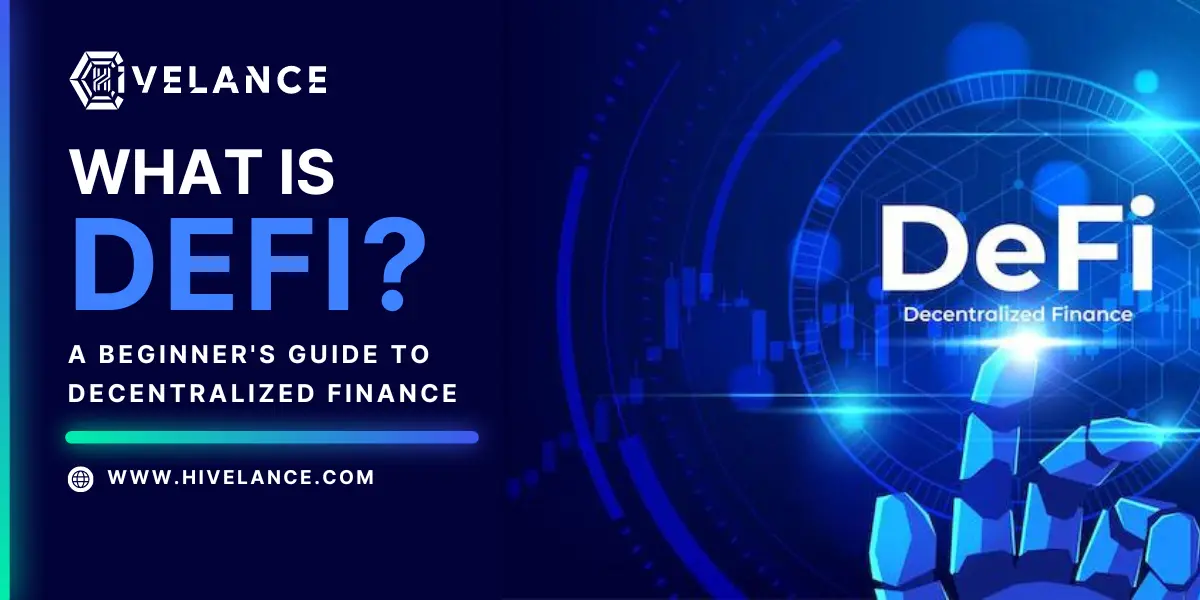What is DeFi?
Decentralized finance concisely known as Defi, is a mushrooming financial technology that eliminates the additional fee charged by third parties. Unlike centralized finance which involves arbitrators such as banks, and brokerage; DeFi neither involves central governing bodies like banks nor brokerages. In DeFi transactions are done by p2p. Defi makes global transactions possible without a mediator, and you can make transactions to people around the world with the help of the internet. Defi is used for lending, borrowing and trading globally. In centralized finance, central governing body like banks has control over your money which is not in the case of DeFi where assets are being controlled by users. Money in DeFi is secured in a digital wallet which can be transferred globally in a minute.
Mechanism of DeFi:
Defi works on blockchain technology. The application used for Defi is called as Decentralised app or Dapps which enables you to make transactions without involving a mediator. Defi runs on the Ethereum blockchain which is known for being transparent so that you can communicate with others. In DeFi lending, borrowing and trades are done with smart contracts which is simply a code that cannot be modified by others. Dapps are built with smart contracts.
Features of DeFi:
Decentralized: On contrary to traditional transactions where transactions have been processed through manpower which can be delayed, whereas in defi transactions have been processed through code. It doesn’t have any central governing authority to control the transactions.
Permissionless: To trade or borrow money in through traditional transactions you need to get acknowledgment from the central governing authority or bank to make transactions. But in DeFi, you only need internet access to do transactions even for international transactions.
Transparency and Privacy: In DeFi, your transactions have always been recorded to display to other users and also for your verification purposes. But it displays the record only in pseudonyms. Defi never shares your personal details with others.
Non-Custodial: you’re the only person who has complete access to your assets and personal data which are being stored in DeFi.
Decentralized Finance vs Centralized Finance:
In DeFi, you are in charge of your finances, whereas in centralized finance, the firm is in charge. In traditional finance, you need approval from a third party, such as a bank, to borrow money or lend it out, but with DeFi, you get to choose how to use the funds. Additionally, in traditional or centralized finance, a brokerage fee will be charged for the amount you got; however, in DeFi this is not always the case. In DeFi, data is recorded on a blockchain so that it may be inspected, and you have access to your transactions. But with centralised finance, you need a moderator's assistance to examine the transactions.
Send and receive money globally: In DeFi, you can make transactions globally, and DeFi helps to send as well as receive money globally without the intervention of third parties. In centralized finance, you have to pay the brokerages for making global transactions. The transactions which are being made through traditional banking have the highest possibility of getting delayed. Because it uses human resources which will be delayed. But in DeFi, transactions are made through the internet, which will be sent or received quickly.
Lending and Borrowing: In traditional finance, borrowing money is the hardest part. Because you have to submit the details for borrowing and the bank will confirm whether you will be able to repay the amount. And conforming to all these they will lend you money. It takes the longest path to reach you. Decentralized finance is contrary to centralized finance, here you don’t need any details to check whether you can repay or not. It only requires collateral as an assurance for the lender. The lender will receive the collateral if the money is not repaid. Here you can use NFT or Non-fungible tokens as collateral.
Transparency and Privacy: In DeFi, the transaction data are recorded as well as transparent, so you can view the transactions that you made. But defi, neither records your personal details nor shares those details. The transactions are shown only in pseudonyms. Whereas in centralized finance, you have to submit all your identity to a third party or organization in the name of verification. And also you cannot view the loan history or transaction history or even the record of your assets without the acknowledgment of the moderator.
Benefits of using DeFi:
- Defi doesn’t involve any meditator for transacting the assets.
- There isn’t any border for transactions, you can exchange assets with anyone around the world.
- Defi is highly secure that any third party cannot access your assets as well as your personal data.
- Defi allows you to take loans without the acknowledgment of central governing or banks.
- In DeFi, transactions are recorded for the purposes of verifying.
Risks of using DeFi:
- The biggest disadvantage of using DeFi is the internet connection since DeFi runs only through an internet connection. If the connection is not proper, transactions cannot be done properly.
- Though DeFi is built on blockchain, which cannot be modified or edited, it has a chance of getting hacked.
- Since DeFi uses collateral for lending and borrowing money, the collateral has to be equal to the value of the amount that you receive as a borrower.
- Wallets are secured with private keys, only you can use the private keys. But if you forget the private keys, you won’t be able to access the wallets. Because private keys cannot be recreated.
The Future of DeFi:
A new financial technology called decentralized finance is revolutionizing the financial industry. You can safely transfer your money since it eliminates third parties like banks or other centralized authorities. Additionally, it supports international trade. Since there are no laws and regulations, anybody can engage in illegal behavior, hence the government is drafting legislation pertaining to the DeFi. It secures transactions that cross borders. And many others will start using DeFi as a result of raising knowledge of it. But Defi still has a long way to go before becoming popular.
Conclusion:
As stated in this blog, Defi enables you to conduct financial transactions independently of any intermediaries, such as banks. Additionally, it encourages international commerce. Only your pseudonyms are visible to other users; personal information like your name is concealed. Thus, defi eliminates all of the practices used in traditional finance. And evolving to be user-friendly.
 Trends
Trends
 Crypto
Crypto
 Web 3.0
Web 3.0
 AI
AI
 Blockchain
Blockchain
 Fintech
Fintech
 Company
Company



















